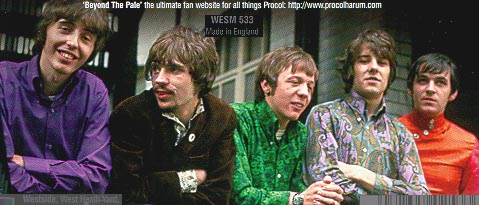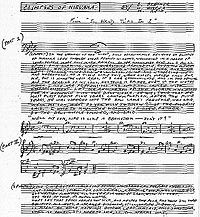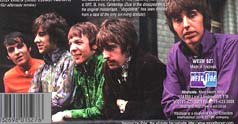
Procol HarumBeyond |
|
|
PH on stage | PH on record | PH in print | BtP features | What's new | Interact with BtP | For sale | Site search | Home |
|
My subtitle to this brief review of Shine on Brightly ... plus! could doubtless be taken in a number of ways: after all it's truly amazing that this is the fourth CD of Shine On Brightly that the serious Procol collector might feel obliged to acquire: the 1992 Castle release needed replacing when the Repertoire one came out with Il Tuo Diamante and the stereo Homburg on it; we got another copy thrown in when we bought the 30th Anniversary Anthology for its third disc of rarities; and now we've got to buy it all again to hear the early Alpha, the only true '... plus!' element that the folks at Westside have come up with, following their apologetic discovery that the promised Gospel According to Matthew wasn't new at all, but only a working title for Wish Me Well.
Equally, it could be taken to refer to 'truly amazing' quality. There's no doubt that the music comes across with splendid clarity, glistening with detail: much of this prompts renewed speculation about the original record: why did it lead off with Quite Rightly So, whose music (not words ... these get more and more fascinating!) is somewhat less distinguished and dramatic than that of Shine On Brightly which as many of us have said before contains some of the most remarkable playing in the whole oeuvre; why is there not more guitar, considering the distinction of Trower's soloing on the first album; what on earth is the coda of Magdalene about; and why does the guitar drop out of the album's final, climactic chord?
But I can't say that the sound here outstrips previous CD versions with the brilliance that the first ... Plus! did; no 'younger' master-tape has come to light. Nor is there so much longing for such an early tape, as we already have this album in stereo. In fact this was the first stereo album our household ever possessed, and I can't forget the astonishment with which we heard the organ solo tracking across the brand-new speakers, as the whole band swapped positions during the instrumental break in Shine on Brightly. The same novelty post Pepper, I'm sure seems to have affected Messrs Cordell and Visconti, who do quite a lot of stereo swapping that I hadn't noticed before: in the tom-tom clatter, for instance, after 'in coming won't be long' during The Autumn Of My Madness. Matthew Fisher took this panning trick to a savage extreme in the Kansas playout, of course.
There are those, of course, who dislike the sound of CDs, and don't enjoy the clarity that they can offer: a perfectly sensible position, given that the artists who made the record can't originally have intended us to hear unblended individuals in the Grand Finale chorus; nor the tumbling jacks in the harpsichord registers; nor the strange percussings we can now hear so clearly before the Aranjuez piano solo in My Moonbeams which itself sounds clearly like a drop-in; nor the late bass entry in Look to your Soul; nor the messy mixing under Autumn's first organ solo, which presumably represents the emergence, from a suddenly-vacated track, of an original bass-guitar part, which we elsewhere hear bounced-down.
But I'm not of that purist faction. The original sonic experience is still there on vinyl if collectors want to return to their auditory youth, and listen with closed eyes to what once sounded like a live band in a huge echoey hall (our rudimentary 1968 equipment seemed to give me a full spatial sense of where every player was stationed at his harpsichord, sitar, or maracas or maybe that effect can be explained by the fact that I was using a 15 year-old brain at the time!). I love the fact that we can now hear so many of the musical ingredients of the songs that were simply messy before: the acoustic guitar on Rambling On and Magdalene, the bass voice in Skip Softly, and the curious gasp (at 8:21 in In Held) of 'It's truly amazing'. Less welcome is the curious, tiny squeak in the very last chord of Grand Finale it sounds like a tape-transport glitch which I don't hear any trace of on my Castle CD version: I wonder at what stage this can have got into the process?
What of the 'rarities'? You can hear the words ... including 'Bum, go away!' clearly on Seem to Have the Blues ... so why does the title still include the word 'Mostly', I wonder? The documentation offers no clue. Monsieur Armand still sounds lightweight, and not much different from the version on The Early Years collection (though the whole of the present CD is a lot louder than the other versions of the same material, which is welcome!). It's very pleasing to have the two versions of In The Wee Small Hours Of Sixpence juxtaposed here though we're none the wiser about the personnel and dates of recording which are discussed here and Il Tuo Diamante remains a one-listen curiosity.
Quite Rightly So, however, must be listened to at least three times ... and it's already appeared on the first ... Plus! album: that's truly amazing as well! The liner-note suggests that Take 4 breaks down a little over halfway through the song: in fact the instrumental track, which sounds utterly familiar, keeps going for three minutes and twenty-odd seconds, when the tape is abruptly halted and we hear a voice say, 'I goofed on the end, but have a listen to the rest of it.': Henry Scott-Irvine's note says this is Denny Cordell talking to Gary, but it could be the other way round; in any event this cursory studio-chat seems to be the chief interest in the track, except to those who will perhaps deduce that some tambourine is added played live with the vocal.
Take 6, which follows, however, has a lot of different phrasing and pitching in the vocal track, and it features the variant words that Keith Reid disavows; it also has minute variation in the guitar solo. These features aren't mentioned at all in the liner-note, though it does draw attention to the longer playout. I don't own the Anniversary Box Set, so I can't comment on the relationship between these two tracks and the Quite Rightly So on the rarities disc of that collection. I guess we have a superfluity of Quite Rightly to make up the running time (65:37), depleted by the lack of Gospel According to Matthew, for which Tony Rounce apologises handsomely in the liner note. Familiarity notwithstanding, that track might have been included: with its extra few seconds of guitar playout about ten, I would guess, though I no longer have a tape of it it would have been as much a variant as the Take 4 QRS.
So should this CD really be entitled 'Nothing That I didn't Know'? No, it should not: a phlegmy cough ushers in the real, unmissable new treat, Alpha. Despite the disappointment over Gospel According, I don't doubt that this exhumation will send all Procoholics straight down to the shops.
Some fans may know of a bootleg whose liner quotes Matthew Fisher as stating that this song was recorded at the A Whiter Shade of Pale session 'with the same session drummer'. The present liner note, however, asserts that Matthew has forgotten all about the track. These claims are not incompatible, of course: but it is a shame that the package doesn't address the issue of this track's personnel, nor the drummership on the variant Sixpences. It could be argued that there isn't space, or that the question is too anorakish for the general buyer: yet this re-release is clearly intended for anorak-users who else wants three versions of Quite Rightly So? In any event, it's a shame not to find any details at all of who played what on the whole record, not even the names of the musicians on the 'official' tracks, let alone the specifics that Procoholics long to know: detailed who-did-whats for Grand Finale, Magdalene, and so forth.
Anyway, it seems likely that we're listening to the capable Bill Eyden here: the drumming is less ropy than the Bobby Harrison we hear on the variant Salad Days from the first ... Plus! record, yet it seems to lack any definitive touches that would persuade us we were listening to BJ. If it does date from that very early session, it's puzzling that it's been included on this album rather than on Westside's first ...Plus! offering. Still, we don't know for sure who's playing: though the piano, organ and vocal sound indisputably Brooker and Fisher, I would say: the bass is quite perky for the early Knights, though perhaps he found the compound time blues-format liberating by contrast to the strictures of AWSoP. I wonder why Brooker and Reid didn't return to this blackly comic five-chord blues, which is harmonically and verbally so much richer than Monsieur Armand, when they were stuck for material for Exotic Birds and Fruit? (And would they have re-titled it, as they did M. R Monde, in order to claim it for Bluebeard Music? Alfalfa, perhaps?)
Alpha made its 'live' début at LA's House Of Blues in 1995: presumably it was the name of the venue that lured this particular blues skeleton out of the Brooker / Reid closet. On that occasion the song was suitably purged of the repeated verses that prolong this recording which really sounds like an early try-out, with Brooker grunting at the end of the marathon as if his breath were not coming easily but I would say that the quality of the 1995 soloing was not as exciting as it is here: the piano break is splendid, and the organ finds its feet rather slowly but is suitably angry at the end (that serpentine AWSoP glissando again) ... only the guitar (possibly Royer? Almost certainly not Trower) is unconvincing, a shapeless meander. No so Geoff Whitehorn at LA!
What are we to make of the words? They're interesting, of course, in that they presumably date from a period before Keith Reid had any success as a lyric-writer: so he's not yet started imitating his former self. The cruel humour here Brooker significantly lightened 'afflicted' into 'offensive' when he sang the number in Los Angeles suggest that Reid's writing might have taken an altogether more straightforward route had not the obliquities of AWSoP captured the world's admiration. I was always amazed that so few commentators picked up the humour in Procol songs: perhaps if Alpha had been the b-side of the huge hit single, things would have turned out different ... not that Lime Street Blues is without its comic moments!.
But thirty years on, of course, Keith Reid is still an almost-unknown quantity, still true to his early role-model Dylan at least in this personal regard. Until some biographer manages both to come up with some facts and to persuade someone to publish them, we who admire his writings continue to grope in the dark. Rediscovered material like this is bound to set would-be analysts on the trail: did Reid's parents really 'dislike' him the word is comically under-powered to the extent of casting him aside? Was his self-consciousness so marked that he felt himself disfigured as if by 'an eye in the middle of his head'? The 'basket' he was packed in makes us think of Moses, a true spiritual leader, while the superfluous eye is reminiscent of the 1956 bestseller by Tuesday Lobsang Rampa, a probably-bogus Tibetan adept: here's the archetypal insecurity of the early albums, writ large over the Jewish / Tibetan axis we also see in 'myrrh, frankincense and fat old Buddhas' and, most concisely, in the Dalai Lama's 'Well, my son ...'.
Our alienated protagonist is so much at sea in the church, on whose mercies he has been thrown, that he can find no more spiritual expression for the priest (or conceivably for God) than 'the man in charge'; and he receives no more hopeful doctrine than 'You can earn your daily bread' ... bread which a believer would expect to receive gratis, through Grace alone. Eventually consigned to a Quasimodo-like fate among the bats in the belfry, the displaced child regrets only his 'lousy luck' ... the callousness of the parents amply inherited by their self-loathing offspring. Food for thought, I think.

Henry Scott-Irvine's ephemera in this package include a clear shot of the Essex Music lead-sheet for In Held: you can read 'for want of iron, with no mop,' a perfectly bizarre mishearing. The original Paul Williams liner-note is reprinted (with some typos) and both UK and US sleeves make an appearance ... one wonders why these sleeves weren't designed by Keith Reid's partner Dickinson, who contributed the first, third and fourth albums' covers: maybe there's a clue (thanks, Sam!) in the amatory schism apparently apologised for in Quite Rightly So. Sadly there's still no picture of Reid, though a monochrome Brooker stares soulfully up from the transparent plastic under the CD, which itself depicts the familiar hellish Bechstein and web-foot clock.
The unpublished picture in this package was evidently taken within moments of the unpublished picture from the first ... Plus! album, but variety is added by the fact that one of them is reproduced back-to-front! Graphic design is again by Jon Storey, who is wryly credited with 'Package remix'. It's nice to see a second name-check for Beyond the Pale!

 |
Richard Beck points out that the picture above, from Shine on Brightly ... Plus!, shows the band's shirts buttoning correctly, left over right, and Brooker parting his hair left to right. The PH+ picture (left) appears to be the one seen through the looking-glass. |
So there we are. It would be irresponsible for a specialised reviewer not to have picked up some of the irritations listed above: it would equally be wrong to dwell on them. Obviously this is an album full of superb music, which I guess anyone who has bothered to read this far will certainly set about acquiring. It also contains promise of a spicier set of variants in the A Salty Dog ... Plus! collection, due in the Spring: there are certainly some completely new versions of familiar songs scheduled for that.
Meanwhile we have the opportunity to clear our shelves of some of the CDs that have been made redundant by the release of this must-have: completists may throw up their hands in horror, but others will head for the online auctions, or seek customers on the Procol message-list or at BtP's own 'Beanstalk' forum. Maybe one or two will spare a kindly thought for Tomas Eimutis and his fellow-fans in Lithuania? That would be truly amazing!
Order Shine On Brightly ... Plus! from Amazon USA
Order Shine On Brightly ... Plus! from Amazon UK
Order this CD from Amazon Germany
|
PH on stage | PH on record | PH in print | BtP features | What's new | Interact with BtP | For sale | Site search | Home |